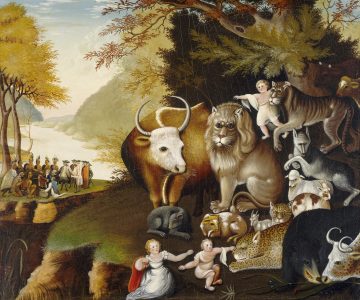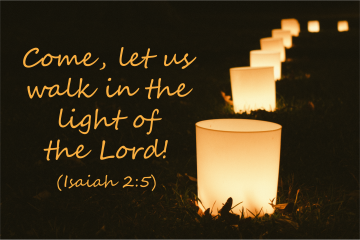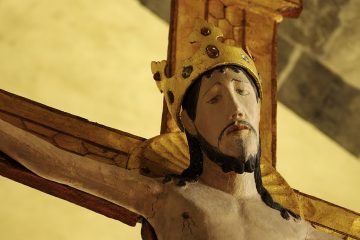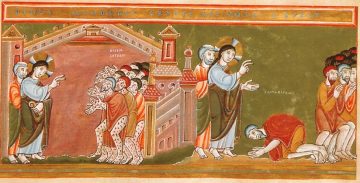Martin Tarr

On the Second Sunday of Advent we are reminded that a fundamental change of heart is necessary if we are to experience the coming of God’s peaceable kingdom. This change of heart is repentance, without which participation in God’s kingdom will not be possible. Matthew’s Gospel reminds us of the need to repent now.
There’s an urgency in the call of John the Baptist; the rule of God is about to break upon the world; the words of the prophets are about to be fulfilled. John’s appearance, the way he dresses and the way he behaves, quite deliberately recall the prophet Elijah. John is a new prophetic voice after centuries of silence, of patient waiting for God to act anew, and the people respond to him in large numbers.
Everyone, even the religious leaders, is eager for some new thing to set them free. It’s very important that even the most religious people repent and don’t just rely on their position in the Synagogue as evidence of their righteousness, for God’s coming activity will involve judgement as well as redemption and none will be exempt. The call must be to stop where you are and turn back to God.
This is an extract from Sheila Cameron’s sermon on 4 December. Do read the whole of it, downloadable at this link, to see the link with the picture by Edward Hicks, which comes from the online collection of the National Gallery of Art, Washington, D.C. (https://commons.wikimedia.org/w/index.php?curid=175611)

Sheila Cameron’s sermon on Advent Sunday ended with these words:
Isaiah sees the house of the Lord as being the place from which the whole earth will receive instruction in the ways of peace. The image of light is also very important in this passage. Our text ends with the call to action: “O house of Jacob, come, let us walk in the light of the Lord!” Our life in Christ is a movement from darkness into light, from ignorance, depression, fear or anxiety into assurance of God’s presence with us, mediated by Christ, the one in whom God took our human nature on himself and redeemed it. With Christ we live in light, whatever the darkness of the world that surrounds us. This is the good news in which we rejoice and which we proclaim to the world in our speech, our attitude and our demeanour. In the light of Christ, everything is possible, here and now. Not when this world ends and another one begins, but right here and now.
Our Gospel reminds us that the world beyond this one is not a remote, hypothetical place but a reality that can break upon us at any time. We are to be prepared; in other words, we are to live here and now as if we were living then, in the presence of God. It’s here and now that we can know the joy of walking in the light of Christ and the safety of dwelling in the house of the Lord.
We pray that during this holy season of Advent, our Christian community might be a place where many who have been traumatised by what they have experienced in this life may find peace and joy and safety in his presence. Amen.
For an insight into Sheila’s choice of title, you’ll need to read the whole of her sermon (available at this link). In it she made reference to the international campaign “16 Days of Activism against gender-based violence” organised by the Mothers’ Union, and to the work of the charity Embrace the Middle East.
The text of our image was overlaid on a photograph by Joshua Rodriguez on Unsplash.
 “The Angels of Christmas” is a series of Advent Bible Studies on Zoom led by Rev Eddie Sykes on Thursdays in December. Each Zoom meeting starts at 10:00am – note that this is slightly earlier than previous studies – and will finish shortly after 11:00am. If you haven’t received the meeting details direct, please email Eddie at minister@rosythmethodist.org.uk for an access code.
“The Angels of Christmas” is a series of Advent Bible Studies on Zoom led by Rev Eddie Sykes on Thursdays in December. Each Zoom meeting starts at 10:00am – note that this is slightly earlier than previous studies – and will finish shortly after 11:00am. If you haven’t received the meeting details direct, please email Eddie at minister@rosythmethodist.org.uk for an access code.
This study is based on the book ‘The Angels of Christmas – Hearing God’s Voice in Advent’ by Susan Robb, published by Abingdon Press only two months ago (ISBN: 978-1791024253). The topics for the sessions are:
1 December – Standing in the Presence of God
Gabriel and Zechariah – Luke 1:5–25
8 December – Let it Be
Gabriel and Mary – Luke 1:26-38
15 December – Acting on the Unbelievable
The Angel of the Lord and Joseph – Matthew 1:18–25
22 December – Hark the Herald Angels Sing
The Angels and the Shepherds – Luke 2:1–14

Rev Sheila Cameron’s sermon on 20 November – on the last Sunday after Pentecost, kept as the feast of Christ the King – included this challenge …
Christ the King is the God who lived among us and shared our humanity. If we are to represent his kingdom and make it visible among us, then we must show God’s concern for those who struggle in this world: the poor, the lonely, the rejected, the vulnerable and the suffering. Our reading from Jeremiah 23:1–6 speaks of shepherds who have failed – evidently kings and leaders who let the people down by not protecting or nurturing them, perhaps pursuing personal ambition or the desire for power or wealth. The sheep have been scattered and have become prey to wild animals.
What are the hazards that threaten today’s flocks? Country folk know that shepherds are experts in the ways of sheep, aware of all the dangers they may encounter and the diseases that may afflict them, which suggests to me that Christians should be experts in the ways of the world if they are to reach out to others as Christ did, with courage and empathy, and also taking the same kind of risk that led to his suffering and death on the cross. Are we up to that challenge, prepared to live sacrificially, as we must be if we are to be effective shepherds in today’s world?
Do read the whole of Sheila’s sermon at this link.
Our image was taken in June 2021, and comes from the collection Triumph crucifixes in Gotland by Bene Riobó, CC BY-SA 4.0, via Wikimedia Commons.

In many ways Rev Sheila Cameron’s sermon on 9 October continued the theme of faith that she had started the week before. Here are some extracts …
Naaman the successful commander thought that something spectacular had to be done to get God’s attention, and especially for him, because he was such an important person: “I thought that for me he would surely come out, and stand and call on the name of the Lord his God, and would wave his hand over the spot, and cure the leprosy!” But the elusive prophet Elisha didn’t even come out of his house or perform any spectacular rituals at all. And Naaman the warrior was offended. But he received the gift of healing as a reward for the grain of faith he carried with him, obeying the instruction to wash seven times in the River Jordan, and his response was to praise God and make thank offerings to Elisha.
All we need is that tiny grain of faith and the willingness to place everything in the hands of God. Don’t we have a tendency to make life more difficult for ourselves than is necessary? Don’t we assume we have to make extraordinary efforts to increase attendance in our churches? But our efforts on behalf of the church would be in vain without the gifts of faith and prayer and in vain without the power of God.
…
Thinking of the plight of many churches in recent years, these efforts didn’t seem to bear much fruit in terms of greatly increased numbers in the pews, and several denominations have had to close down many of their buildings as being no longer affordable, but that doesn’t mean that the Christian faith is moribund. We may have been powerless to recreate Sunday attendance as it was a generation ago, but the life of the church continues to bear witness to the presence and grace of God in its openness to every individual. The recent lockdowns have forced us to explore new ways of doing things, reaching out to house-bound and isolated worshippers, and have revealed people’s hunger for God through the often amazing response to online offerings.
…
We preach the gospel of a Christ alive in the midst of us, calling us to bring the world back to God though nurturing tiny seeds of faith and growing them into a harvest of praise and thanksgiving. And our faith is strengthened daily by awareness of his grace, by the experience of faith rewarded. We who know Christ as our Saviour, who can identify with Christ on the cross, or who have encountered the risen Lord in the course of our life’s journey, have an unshakable confidence that he will always be with us and, as we cherish this certainty and live it day by day, we long to share it with all whom we meet.
Do read the whole of Sheila’s sermon at this link.
The image of the Cleansing of the ten lepers comes from the Codex Aureus Epternacensis (c. 1035–1040). The scribe/artist is unknown, and the image comes via Wikimedia Commons.